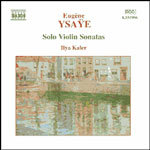
Solo Violin Sonatas, Op. 27
 $25.00
Out of Stock
$25.00
Out of Stock6+ weeks add to cart
Eugene YSAYE
Solo Violin Sonatas, Op. 27
Ilya Kaler, violin
[ Naxos / CD ]
Release Date: Friday 2 April 2004
This item is currently out of stock. It may take 6 or more weeks to obtain from when you place your order as this is a specialist product.
Five Star Rating
BBC Music Magazine April 2004
Ysaÿe had considerable influence on the development of violin-playing after Wienawski and Vieuxtemps, and there are many reminiscences of his playing and teaching.
"The Russian violinist Ilya Kaler, gold medalist in the Sibelius, Tchaikovsky and Paganini competitions and now teaching in Chicago, gives a performance of the utmost confidence and command, strongly characterising each of the six works."
- BBC Music Magazine
The Belgian violinist Eugène-Auguste Ysaÿe was among the leading virtuosi of his day, inspiring admiration rather than jealous rivalry from other great contemporary performers. Born in Liège in 1858, he was taught by his father, Nicolas-Joseph Isaye, a violinist and opera conductor, and entered the Liège Conservatoire in 1865, studying there with D. Heynberg. At the death of his mother in 1868 and after disagreement with his teacher, he left, accompanying his father on concert tours and playing in the orchestras the latter conducted. In 1872 he returned to Liège to study with Rodolphe and Léon Massart, completing his training there with distinction in 1874. He continued his studies with Wienawski in Brussels and later, from 1876 to 1879, with Vieuxtemps in Paris.
After leaving Paris, Ysaÿe took a position as leader of the Bilse orchestra in Berlin, where he continued until 1882. The period brought concert tours through Scandinavia and Russia with Anton Rubinstein, a collaboration that he found helped his own musical development. In 1883 he returned to Paris, associating there with leading composers, including César Franck and Camille Saint-Saëns, and, from the younger generation, Ernest Chausson, Gabriel Fauré, Vincent d'Indy and Claude Debussy, exercising an important influence on French violin music of the time. Franck's Violin Sonata was dedicated to him as a wedding present, and Ysaÿe gave the first performances in Brussels in 1886, and then in Paris. Other dedications included Chausson's Poème and Violin Concerto and Debussy's String Quartet.
In 1886 Ysaÿe returned to Brussels as a professor at the Royal Conservatoire, holding the position there until 1898. In addition to his continuing international career as a performer, he conducted concerts at home, giving exposure in particular to new works by French and Belgian composers. In 1888 he established the Ysaÿe Quartet, with the violinist Mathieu Crickboom, Léon Van Hout and Joseph Jacob, and started the Concerts Ysaÿe, which, with a break during the 1914-18 war, when he was in England and then America, continued until 1940. By 1922 he was in Brussels again, but directed his attention more particularly to conducting, after trouble with his bowing arm. He had suffered for some time from diabetes and in 1929 his right foot was amputated. This did not prevent him from conducting his last concert in Brussels in 1930 and in March the following year his opera Pière li houïeu (Peter the Miner) was staged in Liège and then in Brussels. His health allowed him to attend the second of these, three weeks before his death on 12th May 1931.
Ysaÿe had considerable influence on the development of violin-playing after Wienawski and Vieuxtemps, and there are many reminiscences of his playing and teaching. Yehudi Menuhin recalls a visit to Brussels to see Ysaÿe, the mentor of his own teacher, Louis Persinger, when he was, quite rightly, told to practise scales and arpeggios, advice that other great teachers have been heard to give. Joseph Szigeti recalled Ysaÿe's father's early prohibition of premature use of vibrato, finding here the reason for Ysaÿe's own disciplined use of this technique, while Carl Flesch declared Ysaÿe's influence the most vital and continuing. In 1937 the Eugène Ysaÿe International Competition was established, an event that later became the Queen Elisabeth of Belgium Competition. As a composer Ysaÿe lacked formal training but wrote a number of works for violin and orchestra, orchestral compositions and chamber music.
Tracks:
Sonata No. 1 in G minor, Op. 27
Sonata No. 2 in A minor, Op. 27
Sonata No. 3 in D minor, Op. 27, "Ballade"
Sonata No. 4 in E minor, Op. 27
Sonata No. 5 in G major, Op. 27
Sonata No. 6 in E major, Op. 27
